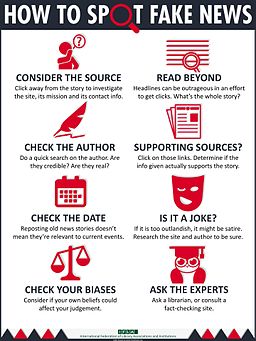How to Spot Fake News FactCheck.org
Fake News
Journalism Fake News & Disinformation (UNESCO 2018)
- Journalism Fake News & Disinformation: Handbook for Journalism Education and Training (UNESCO,Cherilyn Ireton and Julie Posetti, 2018)UNESCO works to strengthen journalism education, and this publication is the latest offering in a line of cutting-edge knowledge resources. It is part of the “Global Initiative for Excellence in Journalism Education”, which is a focus of UNESCO’s International Programme for the Development of Communication (IPDC). The Initiative seeks to engage with teaching, practising and researching of journalism from a global perspective, including sharing international good practices
The CRAAP Test

Use the CRAAP test: stands for Currency, Relevance, Authority, Accuracy, and Purpose.
- Look at your resource
- Who is the author?
- What are their credentials?
- What is their reputation in their field?
- What date was this created?
- Examine the content
- Is the argument organised logically?
- Is it easy to read?
- Has it been peer reviewed?
- Is the evidence resource or opinion based?
- Consider the style & approach
- Who is the target audience?
- What coverage have they given the subject?
- What type of source is it primary or secondary?
LIST Tutorial – Sourcing and Evaluating Information
The SMELL Test

In this age of information how can we tell fact from fiction. While CRAAP may be able to eliminate irrelevant information in the traditional formats. It does not always fair well in terms of modern formats.
In the age of FAKE news – SMELL can help you vet the quality of information
S stands for Source. Who is providing the information?
M is for Motivation. Why are they telling me this?
E represents Evidence. What evidence is provided for generalizations?
L is for Logic. Do the facts logically compel the conclusions?
L is for Left out. What’s missing that might change our interpretation of the information?
Filter Bubbles
As web companies strive to tailor their services (including news and search results) to our personal tastes, there's a dangerous unintended consequence: We get trapped in a "filter bubble" and don't get exposed to information that could challenge or broaden our worldview. Eli Pariser argues powerfully that this will ultimately prove to be bad for us and bad for democracy.
The Danger of Science Denial
Vaccine-autism claims, "Frankenfood" bans, the herbal cure craze: All point to the public's growing fear (and, often, outright denial) of science and reason, says Michael Specter. He warns the trend spells disaster for human progress.
Moral bias behind search results
Search engines have become our most trusted sources of information and arbiters of truth. But can we ever get an unbiased search result? Swedish author and journalist Andreas Ekström argues that such a thing is a philosophical impossibility. In this thoughtful talk, he calls on us to strengthen the bonds between technology and the humanities, and he reminds us that behind every algorithm is a set of personal beliefs that no code can ever completely eradicate.


